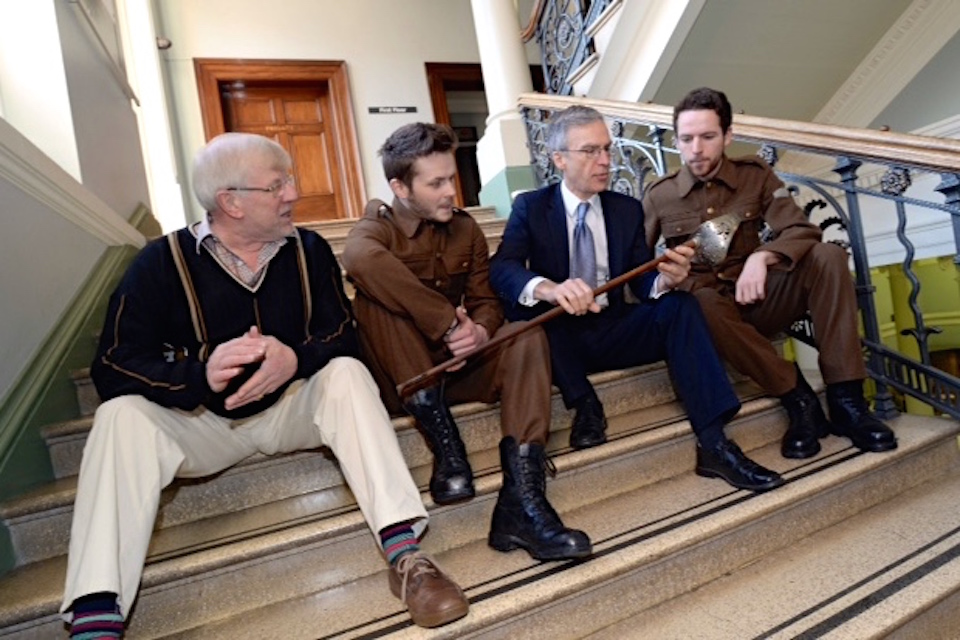Dr Murrison address to WW1 ancestors' memories event
Libraries NI and Living Legacies 1914-18 organised a First World War commemoration event, WW1 and You - Objects and Memories which Dr Andrew Murrison addressed

It’s a great pleasure to be here today thank you for asking me. I am extremely grateful to Dr Paul Ell for the kind words of introduction and I really welcome the work that the centre is doing in helping communities to explore and share their personal connect with the First World War.
Next year will see two great commemorations in the island of Ireland – the centenary of the battle of the Somme and the Easter Rising.
History matters.
And this being Northern Ireland, history is always complex and nuanced.
I regret that too often it is suborned and manipulated for political or sectarian purposes.
When I began my work on the centenary in late 2011 I was advised by some that the centenary of the Great War presented massive risk in a part of the world at last making strides towards normality. Be careful, I was told, tread warily.
But you know what? Where I was told lay danger, I found opportunity. Where I was told to expect hostility, I found goodwill and enthusiasm to explore shared history in a way that would bring people together, not set them apart.
The Great War is itself contentious. Was it a Just War or was it just an appalling tragedy – a meaningless bloodbath engineered by the top brass of Europe’s end of life empires?
My view is that the UK of Great Britain and Ireland as it was did the right thing by entering the war given how things looked in August 1914.
True enough, had Herbert Asquith known that the war would cost at least 10 million dead including his own son he may have baulked at the price. I think we all would. But he had no crystal ball in the summer of 1914.
We can debate the causes conduct and consequences of the war but what has struck me most is the interest shown across the country in the personal and parochial. People are interested in the lives of men and women 100 years ago rather than the antics of statesmen and the lines on a chart.
In Ireland, given what happened from 1916 onwards there has been far less enthusiasm on the part of nationalist families to talk about forebears who served in the British Army.
Eamon Gilmour put it this way;
The First World War in Ireland was seen for many years as a divisive part of our troubled legacy. And because of this there was a tendency to avoid any interrogation of Irish involvement.
However, we have learnt that contending with the past, as we have done over a number of years in relation to Ireland’s role and contribution, has brought with it great opportunities to recognise in our reflections on the war our common humanity, our common cause, and our common heritage.
A practical manifestation of this is the 6th Connaught Rangers Research Group exhibition in Belfast City Hall which brings those Great War warriors from a nationalist tradition in from the cold.
And can I commend the Somme Association and the Somme museum in Newtownards which I have visited for the work they are doing to promote a better understanding of the Great War and in particular to commemorate shared history. I have not yet had the opportunity to visit the East Belfast and The Great War project who are here with us today, but am very much looking forward to hearing about the work they have been involved in.
In her visit to Ireland in 2011, the Queen laid a laurel wreath at the Garden of Remembrance in Dublin to honour those who had died fighting the forces of her grandfather George V.
But they were part of a generation that included many who had returned from fighting in British uniform to a fight against those in British uniform in the Irish war of independence.
Complex and nuanced history indeed and with more twists than a politician.
Ladies and Gentlemen can I finish by congratulating you for the work that has already been done in NI around the centenary, in anticipation of even more to come.
And leave you with the hope that the shared commemoration of the Great War may fulfil its full potential in helping to bring together Northern Ireland’s divided communities.
What a legacy that would be. What a way to honour the memory of those whose lives and times we are examining today.
Thank you.